Quick overview — what this article delivers
- 10 practical, kid-approved breakfasts you can make in 10 minutes or less (with step-by-step directions).
- Make-ahead and storage tips so mornings are truly grab-and-go.
- Equipment, smart substitutions (allergy-friendly), and pantry staples.
- Nutrition estimates per serving (calories, protein, carbs, fat, fiber). These are approximate and great for on-page nutrition callouts.
- SEO meta, Pinterest copy, internal link suggestions and a Canva collage command ready for designers.
Introduction: why 10 minutes matters — and why nutrition still wins
Busy school mornings are a pressure test: backpacks, last-minute homework, shoes that go missing. It’s tempting to skip breakfast or hand over sugary convenience foods. But starting the day with protein + fiber + a little healthy fat stabilizes blood sugar, improves attention, and reduces meltdowns before recess.
This guide gives practical, evidence-minded breakfasts that parents can make in 10 minutes — or prepare ahead so mornings don’t feel like a battleground. Short paragraphs, realistic swaps, and kid psychology tips included. No Pinterest-perfect staging required — just reliable food that fuels learning and mood.
The building blocks of a balanced 10-minute breakfast
Aim to combine three elements each morning:
- Protein (6–20 g) — eggs, dairy, Greek yogurt, nut butter, cottage cheese. Keeps kids full and supports cognition.
- Fiber & whole grains — whole-wheat tortillas, oats, fruit, whole-grain waffles. Slow carbs for steady energy.
- Healthy fat (optional, small portion) — nut butters, seeds, avocado. Great for brain development and satiety.
Hydration is part of breakfast: a glass of water or milk matters. Avoid sweetened drinks and high-sugar cereals.
Equipment & pantry essentials for 10-minute mornings
Keep these on hand so you can hit the 10-minute mark:
- Blender (for smoothies)
- Microwave-safe mugs & containers (egg-mug, overnight jars)
- Nonstick skillet / small griddle
- Mason jars for parfaits & overnight oats
- Toaster or toaster oven
- Measuring spoons, a serrated knife, cutting board
Pantry staples to keep stocked: rolled oats, whole-wheat tortillas, peanut/almond or sunflower seed butter, chia seeds, canned pineapple or berries, quick-cook whole-grain waffles, Greek yogurt, eggs, shelf-stable milk alternatives.
Sensory pause — an honest parenting moment
Picture your kid taking the first bite and pausing — the sleepy face brightens, and you get five uninterrupted minutes to breathe. That’s the payoff for ten mindful minutes of prep. Little changes add up.
10-Minute Recipes (detailed, step-by-step, with swaps, make-ahead tips & nutrition)
Notes: Nutrition values are approximate and calculated per serving. Use product labels or a nutrition tool for exact numbers if needed.
1) Peanut-Butter Banana Wrap — 5 minutes

Why it works: Warm, chewy, sweet — protein + potassium + whole grain.
Ingredients (1 serving):
- 1 whole-wheat tortilla
- 1 tbsp natural peanut butter (or sunflower seed butter)
- 1 small banana, whole or halved
- 1 tsp chia seeds (optional)
Method:
- Spread peanut butter over tortilla.
- Place banana on edge, roll tightly.
- Slice into rounds or leave whole for older kids. Sprinkle chia seeds.
Kid variation: Add a small drizzle of honey for older kids (not for infants under 1 year).
Make-ahead: Spread peanut butter on tortillas and seal in fridge; assemble in 1 minute in the morning. Banana slices brown quickly — slice just before serving.
Allergy swaps: Use sunflower seed butter to make nut-free.
Storage: Best fresh. If made ahead, keep in airtight bag for same-day use.
Nutrition (approx / serving): 338 kcal | 9.5 g protein | 52.1 g carbs | 12.9 g fat | 7.3 g fiber.
2) Greek Yogurt Parfait — 7 minutes (or assemble the night before)
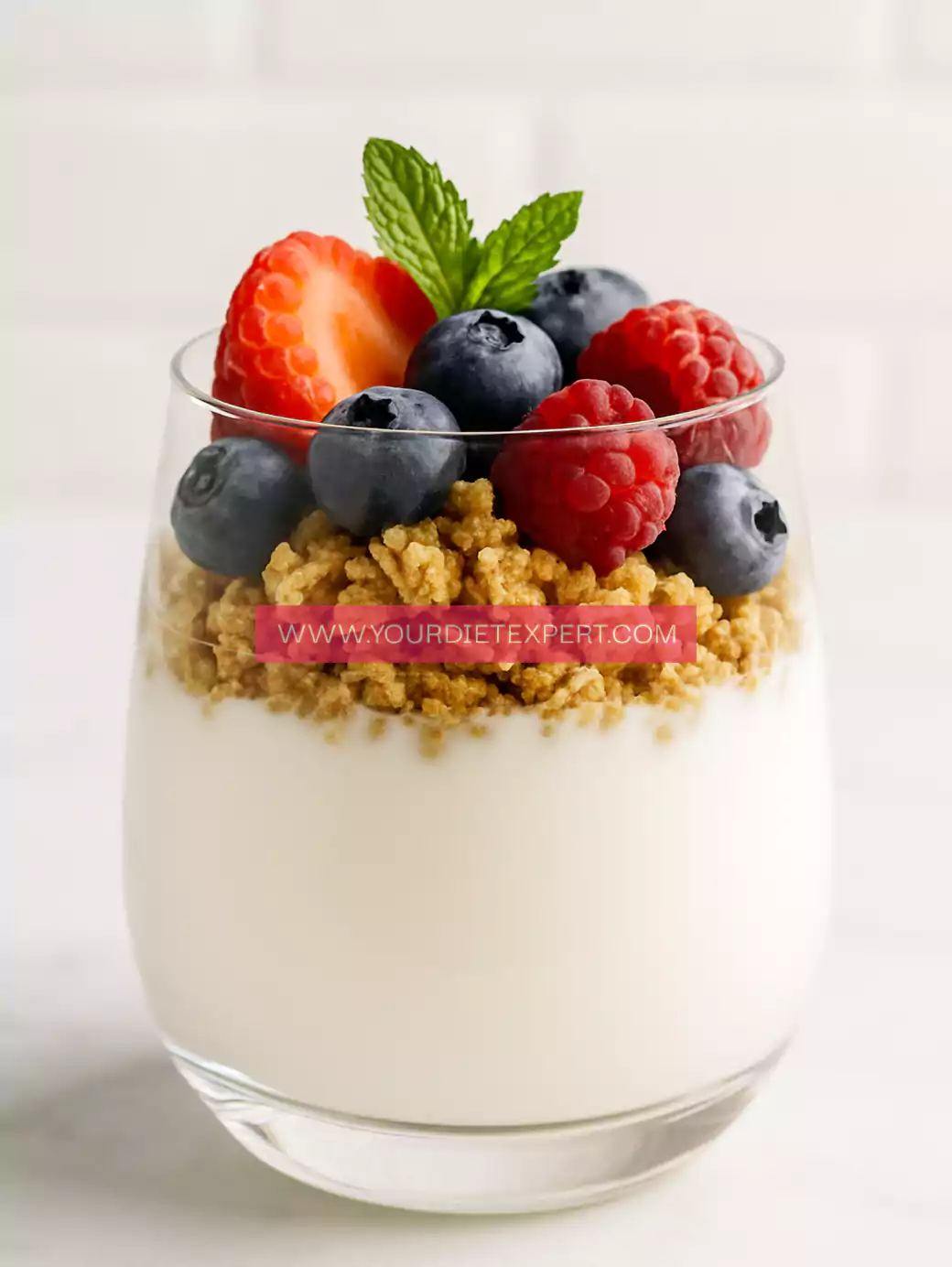
Why it works: High protein, calcium, probiotics. Very adaptable for picky eaters.
Ingredients (1 jar):
- 1 cup plain Greek yogurt
- ¼ cup low-sugar granola or toasted oats
- ½ cup mixed berries (fresh or thawed frozen)
- ½ tsp honey (optional)
Method:
- Layer yogurt > berries > granola in a jar or bowl.
- Top with honey if desired. Close jar and grab.
Kid tips: Let children add their own toppings at the counter. They’ll feel in control.
Make-ahead: Layer yogurt and berries; keep granola separate to preserve crunch. Combine at morning.
Allergy swaps: Use dairy-free coconut or soy yogurt (note: protein will be lower).
Storage: 24–48 hours refrigerated if granola kept separate.
Nutrition (approx / serving): 280 kcal | 25.5 g protein | 36.9 g carbs | 4.3 g fat | 5.5 g fiber.
3) Egg & Cheese Microwave Mug — 2–3 minutes

Why it works: Hot, savory protein for steady focus — and quick.
Ingredients (1 mug):
- 1 large egg
- 1 tbsp milk (any)
- 2 tbsp shredded cheese
- Optional: small handful chopped spinach or bell pepper
Method:
- In a microwave-safe mug whisk egg + milk + pinch salt. Stir in cheese and optional veg.
- Microwave 60–70 seconds (power varies) until set. Let rest 20 seconds.
Kid swaps: Add diced ham or mild salsa for older kids.
Make-ahead: Whisk egg mixture and refrigerate in a sealed container; microwave then.
Storage: Eat immediately.
Nutrition (approx / serving): 136 kcal | 10 g protein | 1.5 g carbs | 10 g fat | 0 g fiber.
4) Overnight Oats — 5 minutes the night before (ready in morning)

Why it works: No morning prep, high fiber, kid-friendly.
Ingredients (1 jar):
- ½ cup rolled oats
- ½ cup milk or milk alternative
- ½ banana (mashed) or ¼ cup berries
- 1 tsp chia seeds
- Optional: cinnamon, vanilla, nut butter swirl
Method (night before):
- Combine ingredients in jar, stir, refrigerate overnight.
- In the morning stir and top with fruit.
Make-ahead: Make 3–4 jars for the week.
Allergy swaps: Use gluten-free oats if necessary; nut butter optional.
Storage: Keeps 3–4 days in fridge.
Nutrition (approx / serving): 280 kcal | 10.7 g protein | 43.3 g carbs | 6.1 g fat | 6.8 g fiber.
5) Whole-Grain Waffles + Toppings — 5–8 minutes
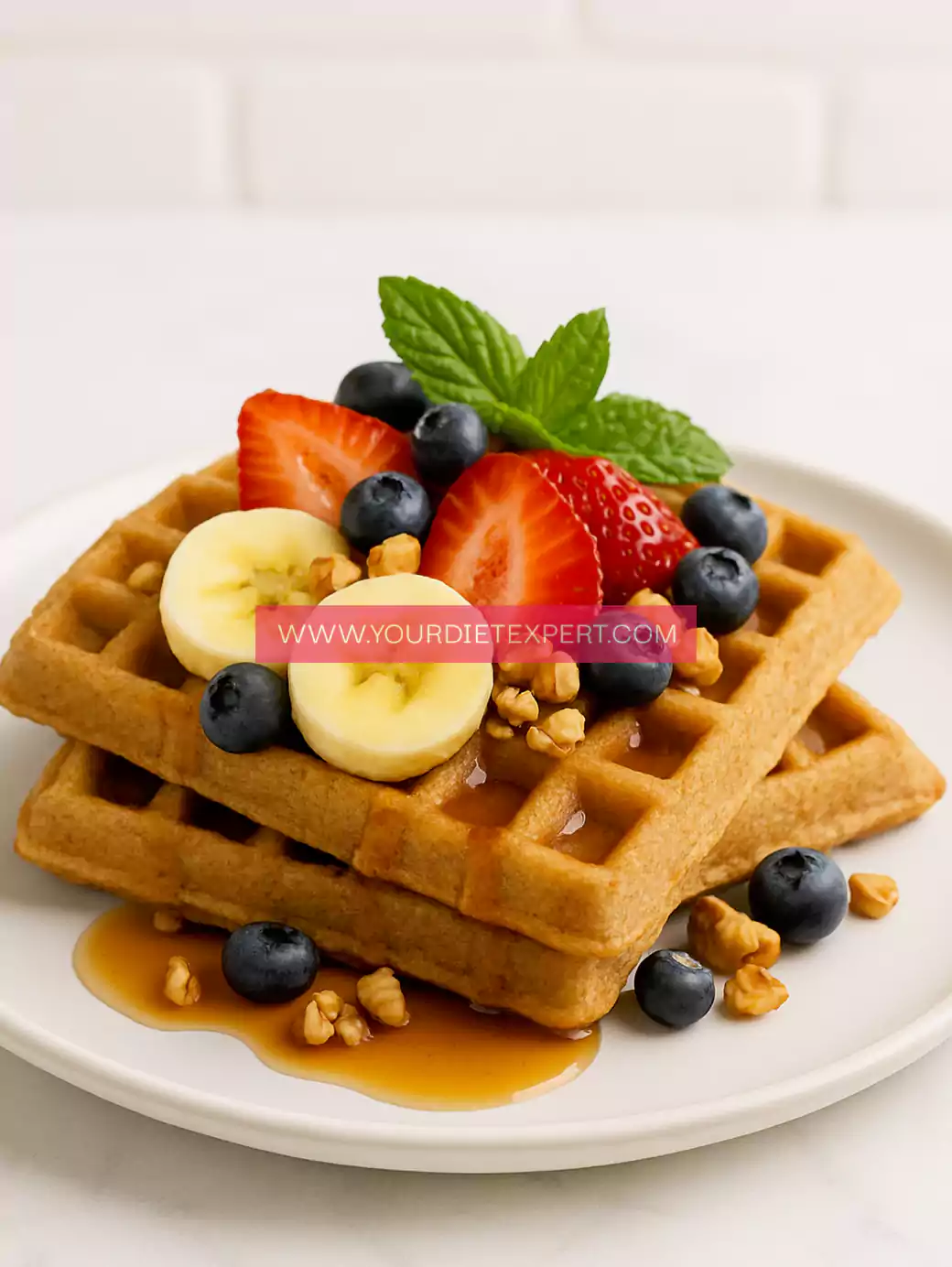
Why it works: Familiar comfort food turned balanced with protein and fruit.
Ingredients (1 serving):
- 2 whole-grain toaster waffles
- 1 tbsp peanut or almond butter
- ½ banana, sliced or ¼ cup berries
Method:
- Toast waffles.
- Spread nut butter and top with banana or berries.
Kid swaps: Yogurt + fruit topping for nut-free option.
Make-ahead: Cook waffles in batch and freeze; toast from frozen.
Storage: Waffles freeze 1–2 months; toppings fresh.
Nutrition (approx / serving): 370 kcal | 12 g protein | 41 g carbs | 19 g fat | 6 g fiber.
6) Mini Breakfast Quesadilla — 8 minutes
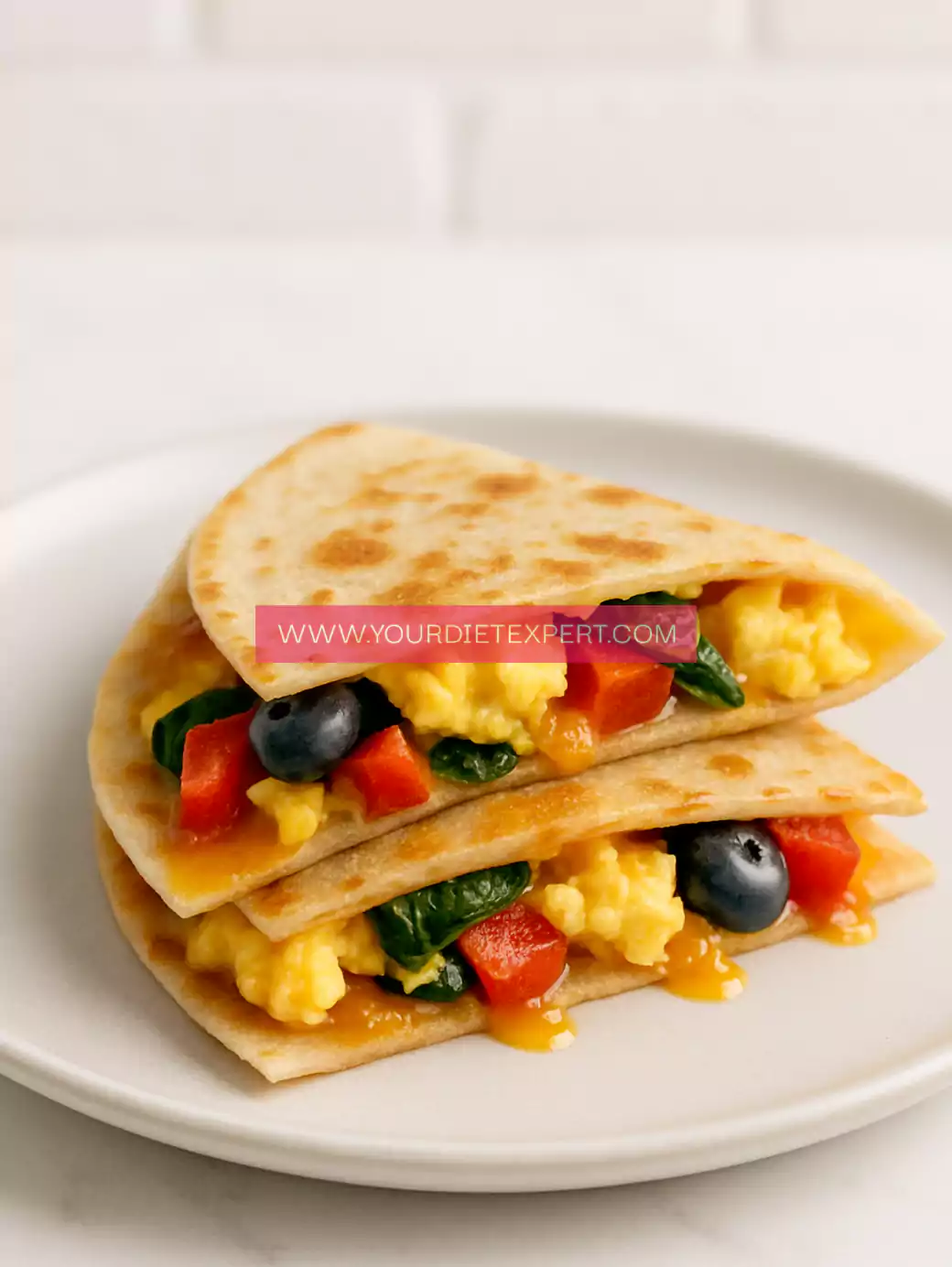
Why it works: Mobile, warm, and customizable.
Ingredients (1 serving):
- 1 small whole-wheat tortilla
- 2 scrambled eggs (or 1 egg + egg white)
- 2 tbsp shredded cheese
- Optional salsa or avocado
Method:
- Layer eggs and cheese on tortilla, fold in half.
- Cook on skillet 2–3 min per side until crispy and cheese melts. Cut into triangles.
Make-ahead: Scramble eggs the night before and reheat in skillet.
Allergy swaps: Use dairy-free cheese or omit cheese.
Storage: Best fresh; keep refrigerated up to 48 hours if prepped.
Nutrition (approx / serving): 270 kcal | 18 g protein | 25 g carbs | 10 g fat | 3 g fiber.
7) Fruit & Nut Energy Bites — 10 minutes (no bake) — 2 bites serving
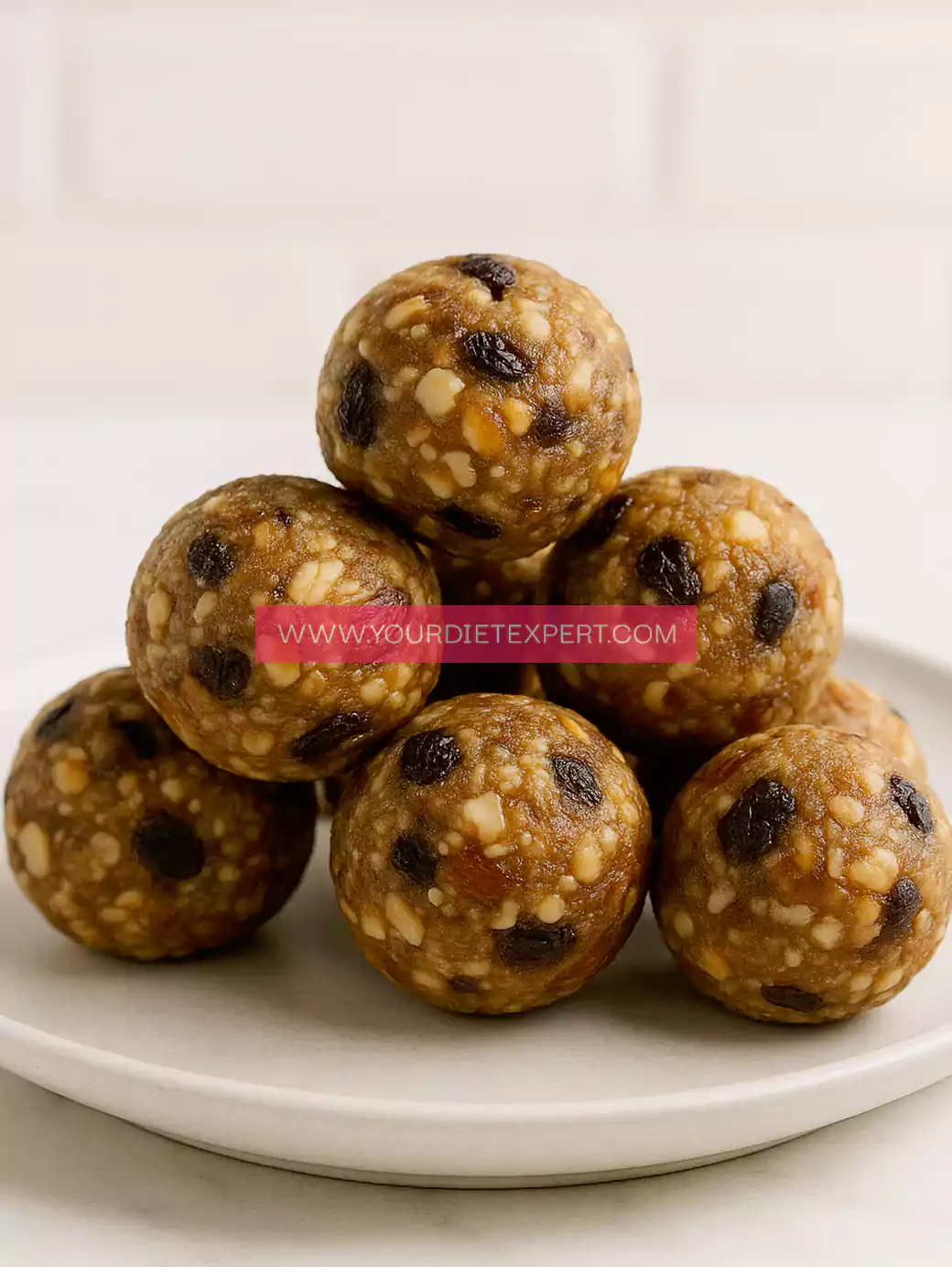
Why it works: High-satiety snack that doubles as a quick breakfast.
Batch recipe (makes ~12): oats, ½ cup peanut butter, ¼ cup honey, ¼ cup mini chocolate chips or raisins — mix & roll.
Serving (2 bites): chewable, portable.
Make-ahead: Store in fridge for 1–2 weeks.
Allergy swaps: Use sunflower seed butter to be nut-free.
Nutrition (approx / serving — 2 bites): 190 kcal | 3.8 g protein | 20.5 g carbs | 18.3 g fat | 2.8 g fiber.
8) Berry-Spinach Smoothie — 5 minutes (blend & go)
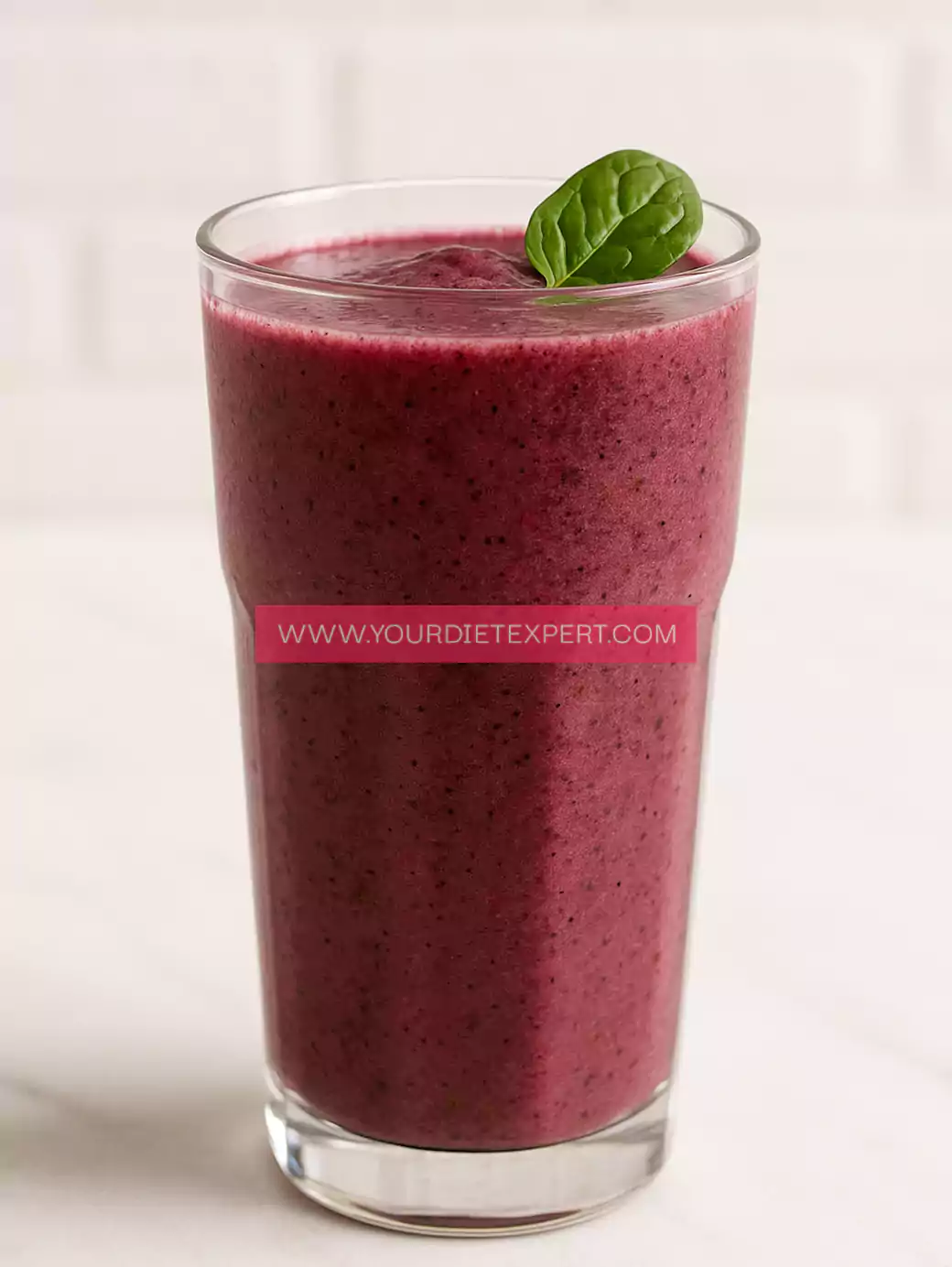
Why it works: Fruit + Greek yogurt + spinach = immune support, protein and a veggie boost.
Ingredients (1 smoothie):
- ½ banana
- ½ cup Greek yogurt
- ½ cup milk (or milk alternative)
- 1 cup frozen mixed berries
- 1 cup fresh spinach (optional)
Method:
- Blend until smooth. Pour into thermos for on-the-run kids.
Make-ahead: Freeze smoothie portions in zip bags; dump into blender with milk.
Allergy swaps: Use dairy-free yogurt — protein will be lower.
Nutrition (approx / serving): 248 kcal | 17.9 g protein | 40.6 g carbs | 3.2 g fat | 8.0 g fiber.
9) Cottage Cheese & Fruit Bowl — 3 minutes

Why it works: Simple, high in casein protein (slow-digesting) which helps mid-morning focus.
Ingredients (1 serving):
- ½ cup low-fat cottage cheese
- ½ cup pineapple or berries
- Optional sprinkle of ground flax or granola
Method: Combine and serve.
Make-ahead: Portion cottage cheese into containers for 2–3 days.
Allergy swaps: For dairy intolerance, replace with high-protein soy/coconut yogurt (lower protein).
Nutrition (approx / serving): 145 kcal | 13 g protein | 15.7 g carbs | 2.6 g fat | 4.4 g fiber.
10) Apple “Sandwiches” with Nut Butter — 5 minutes
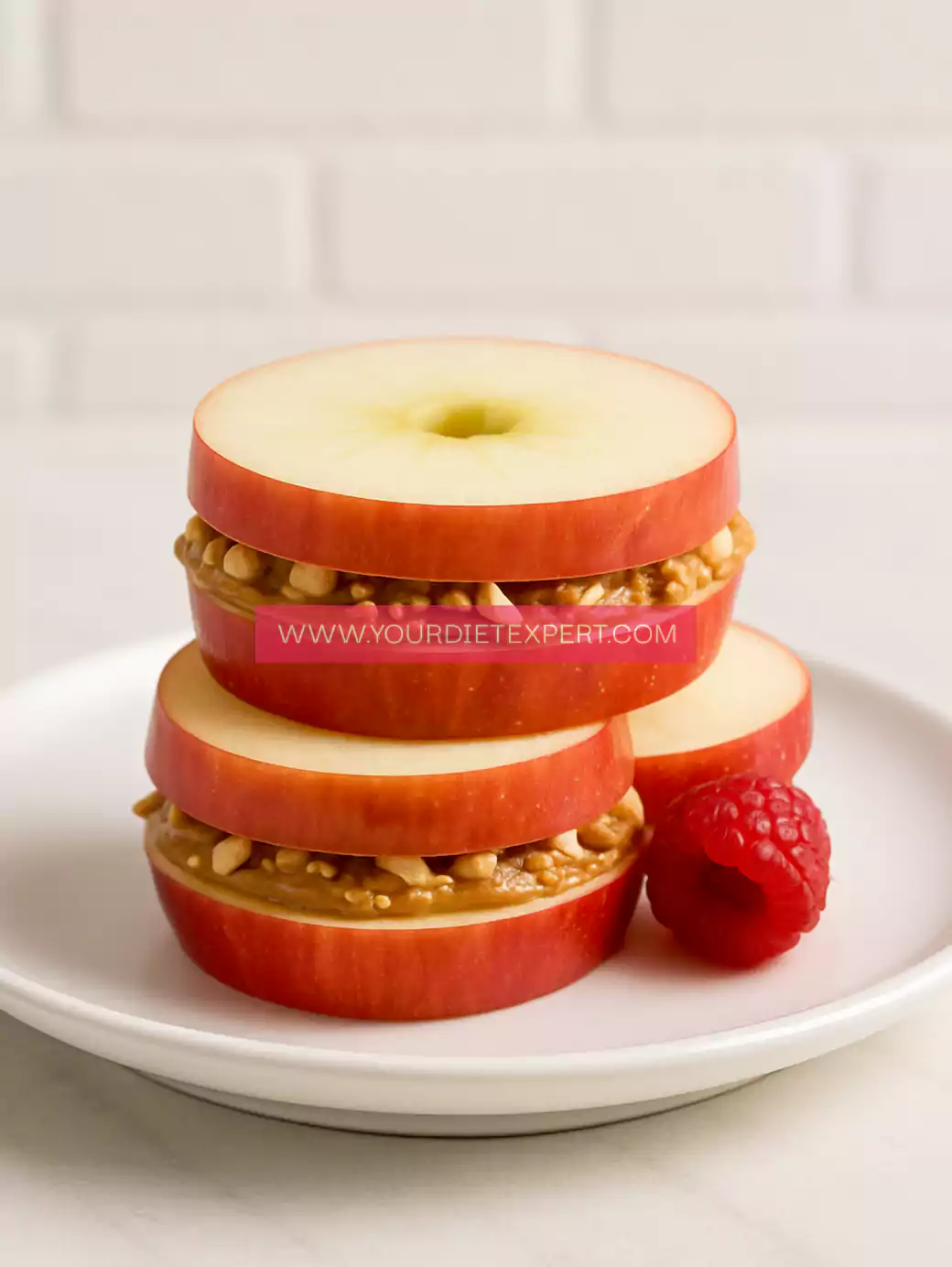
Why it works: Crunch + fiber + fat = slow energy and fun hand-held snack.
Ingredients (1 serving):
- 1 medium apple, cored and sliced into rounds
- 1 tbsp peanut butter or sunflower seed butter
- Optional: sprinkle oats or mini chocolate chips for kids
Method: Spread nut butter on apple rounds and sandwich.
Make-ahead: Core and slice apples and toss with a little lemon juice to reduce browning.
Allergy swaps: Use sunbutter to be nut-free.
Nutrition (approx / serving): 189 kcal | 4 g protein | 28 g carbs | 8.3 g fat | 5 g fiber.
Weekly sample — a realistic 5-day school morning plan
- Mon: Overnight oats + water
- Tue: Greek yogurt parfait + apple slices
- Wed: Egg mug + whole-grain toast or apple sandwiches
- Thu: Smoothie + 1–2 energy bites
- Fri: Peanut butter banana wrap + milk
Rotate to keep novelty and balance carbs/protein through the week.
Picky-eater strategies that actually work
- Let kids customize toppings (yogurt bar). Ownership increases willingness.
- Use fun names (e.g., “Power Parfait”) rather than “healthy” language.
- Sneak flavors in: nut butter swirl, cinnamon, or a berry puree over oats.
- Pair new things with favorites — a single bite of new item alongside a known winner.
Allergy & special-diet swaps (quick reference)
- Nut allergy: sunflower seed butter, soy nut butter, or mashed avocado.
- Dairy allergy: coconut/soy yogurt and dairy-free shaking protein powders (check sugar).
- Gluten-free: certified gluten-free oats, GF tortillas, or buckwheat waffles.
- Vegan: swap eggs for tofu scramble, yogurt for soy yogurt, and add seeds for protein.
Grocery list (core items — 7-10 day supply for a small family)
- Rolled oats, quick oats
- Whole-wheat tortillas, whole-grain waffles (frozen)
- Natural peanut/sunflower or almond butter
- Greek yogurt (or dairy-free option)
- Eggs
- Milk or milk alternative
- Berries (fresh & frozen)
- Bananas, apples
- Chia seeds, ground flax, granola
- Cottage cheese (or high-protein alternative)
Storage, reheating & safety notes
- Eggs: cooked eggs keep 3–4 days refrigerated; reheat gently.
- Overnight oats: 3–4 days refrigerated.
- Smoothies: best fresh; freeze portions for quick blending.
- Energy bites: 1–2 weeks refrigerated; freeze for longer storage.
- Nut butter: watch serving sizes — calorie dense. Good pairing with fiber for balance.
FAQs (concise, practical answers)
Q: What if my child truly won’t eat in the morning?
A: Offer a drinkable option (smoothie) and a portable bite (banana or energy bite). Provide small, frequent wins rather than pressuring.
Q: How often should I rotate breakfasts?
A: Rotate every 3–4 days to maintain familiarity while avoiding boredom.
Q: Can I rely on cereals?
A: Choose whole-grain cereals with ≥3 g fiber and ≤6 g sugar per serving; pair with milk and fruit to boost protein and fiber.
Nutrition summary table (quick copy for recipe cards)
(Approximate per serving — use these on recipe cards; values are rounded.)
- Peanut-Butter Banana Wrap — 338 kcal | 9.5 g protein | 52.1 g carbs | 12.9 g fat | 7.3 g fiber
- Greek Yogurt Parfait — 280 kcal | 25.5 g protein | 36.9 g carbs | 4.3 g fat | 5.5 g fiber
- Microwave Egg & Cheese Mug — 136 kcal | 10 g protein | 1.5 g carbs | 10 g fat | 0 g fiber
- Overnight Oats — 280 kcal | 10.7 g protein | 43.3 g carbs | 6.1 g fat | 6.8 g fiber
- Whole-Grain Waffles + Toppings — 370 kcal | 12 g protein | 41 g carbs | 19 g fat | 6 g fiber
- Mini Breakfast Quesadilla — 270 kcal | 18 g protein | 25 g carbs | 10 g fat | 3 g fiber
- Energy Bites (2) — 190 kcal | 3.8 g protein | 20.5 g carbs | 18.3 g fat | 2.8 g fiber
- Berry-Spinach Smoothie — 248 kcal | 17.9 g protein | 40.6 g carbs | 3.2 g fat | 8 g fiber
- Cottage Cheese & Fruit Bowl — 145 kcal | 13 g protein | 15.7 g carbs | 2.6 g fat | 4.4 g fiber
- Apple Sandwiches w/ Nut Butter — 189 kcal | 4 g protein | 28 g carbs | 8.3 g fat | 5 g fiber

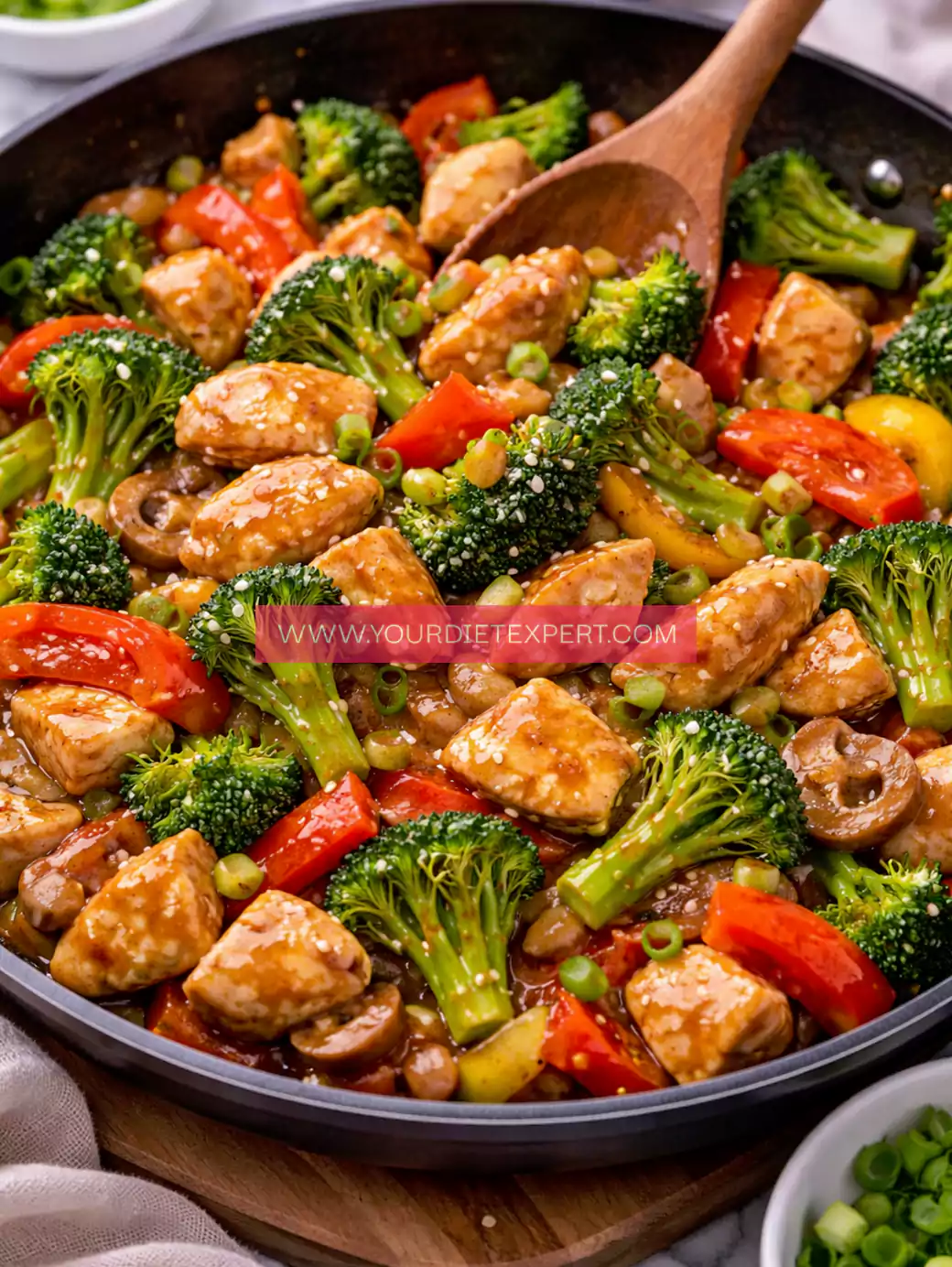
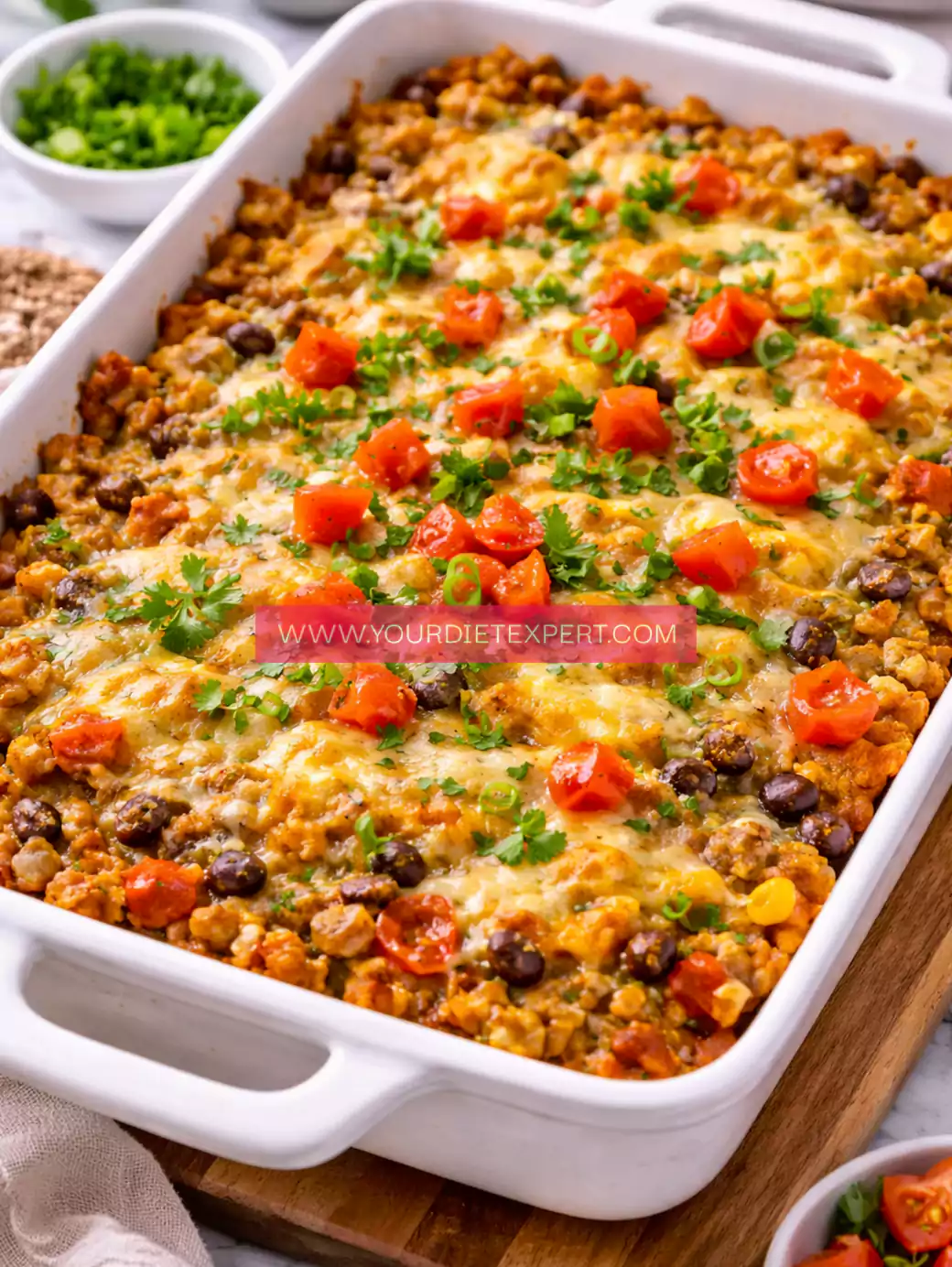
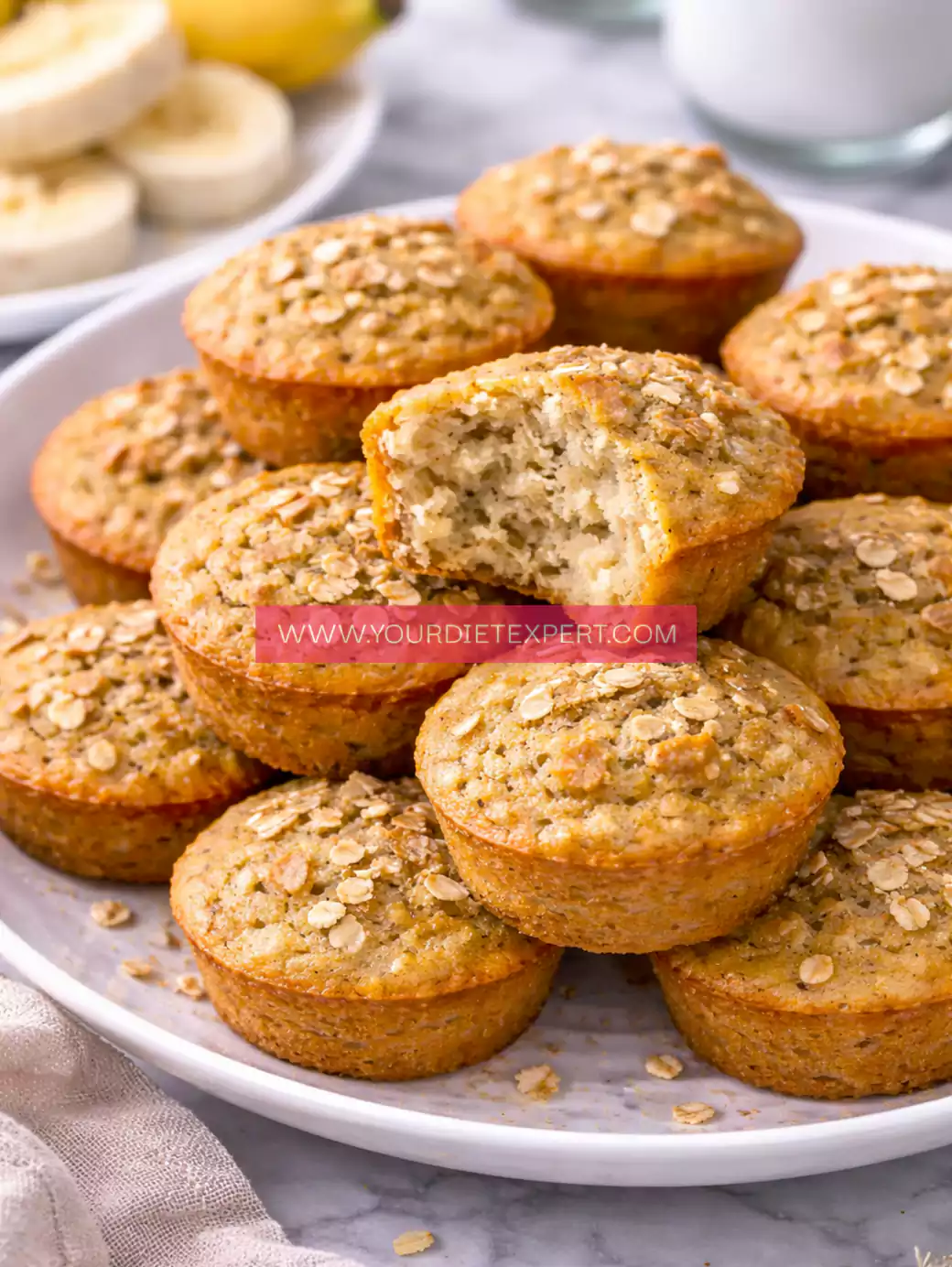
Leave a Reply